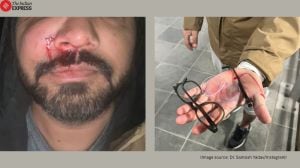Prison authorities can decide on furlough requests of convicts whose appeals are pending in Supreme Court: Delhi HC
The Delhi HC ruled that high courts can review the rejection of furlough requests by prison authorities.
 The convicts, whose criminal appeals are pending before the Supreme Court, had challenged the rejection of their furlough request by the prison authorities. (File Photo)
The convicts, whose criminal appeals are pending before the Supreme Court, had challenged the rejection of their furlough request by the prison authorities. (File Photo)The Delhi High Court Tuesday ruled that prison authorities can decide on parole or furlough requests of convicts whose appeals are pending in the Supreme Court. The court was hearing a challenge to Delhi’s prison rules by convicts in the 1987 Hashimpura massacre.
The convicts had specifically challenged Note 2 to Rule 1224 of the Delhi Prison Rules, 2018, after their requests for furlough were denied by jail authorities earlier. The said provision reads: “If an appeal of a convict is pending before the High Court or the period for filing an appeal before the High Court has not expired, furlough will not be granted and it would be open to the convict to seek appropriate directions from the Court.”
Justices Prathiba Singh and Amit Sharma reasoned, “The fact that “Supreme Court” had not been incorporated in Note 2 to Rule 1224 of the Prison Rules is further fortified from the fact that various other provisions in the Prison Rules have referred to “Supreme Court” in various circumstances, and therefore, non-mentioning of “Supreme Court” in the Note 2 to Rule 1224 of the Prison Rules cannot be considered as an omission. The intention of the Competent Authority while drafting the Rules is clear from the plain language itself that what was restricted was grant of parole/furlough to convicts whose appeals are pending adjudication before the High Court and not Hon’ble Supreme Court.”
The division bench further held that “since mere pendency of Criminal Appeal/Special Leave Petition before the Hon’ble Supreme Court cannot be taken as a bar for release on furlough, each case would be determined on its own eligibility criteria as per Rules by the Competent Authority and the same would be subject to judicial review..by the High Court”. It added that the prison rule provision cannot be interpreted to consider a bar on either the convicts’ right to apply for furlough if their appeal is pending before the Supreme Court.
During the 1987 Hashimpura massacre in Uttar Pradesh’s Meerut, the accused, who were posted for riot control following communal riots, rounded up around 42-45 Muslim men and took them away in a truck. They were later shot, and the bodies were dumped in the Gang Nahar and Hindon canal. Of the 38 who were killed, the bodies of only 11 were identified by families. The remaining bodies were not recovered.
In 2018, a division bench of the Delhi High Court, headed by Justice S Muralidhar, reversed the 2015 acquittal of 16 former members of the Uttar Pradesh Provincial Armed Constabulary (PAC) in the Hashimpura massacre case, and held them guilty of murder, criminal conspiracy, kidnapping, and causing disappearance of evidence. The convicts were sentenced to life imprisonment.
The Delhi High Court also set aside a single judge’s interpretation in an order in July 2023, which had held that the ‘high court’ in the above provision implies any appellate court, which would then include the Delhi High Court as well as the Supreme Court.
The convicts, whose criminal appeals are pending before the Supreme Court, had challenged the rejection of their furlough request by the prison authorities. The latest court ruling means that the high court can now hear their petitions seeking a review of the prison authorities’ rejection.
The division bench in its order held, “To impose a bar on consideration of parole/furlough if a Special Leave Petition or Appeal is pending in the Supreme Court could have completely unpredictable consequences and could also result in practical difficulties for convicts who may require to be granted parole/furlough due to emergent situations.”
“It cannot be expected that every convict would have to compulsorily approach the Supreme Court for temporary release or emergent release in grave situations, including medical exigencies of the convict, demise in the family, any emergency involving children of the convict, etc… The Delhi Prison Rules are categorical and clear that Rule 1224 bars parole/furlough being granted only if the appeal is pending in the High Court. This bar cannot be extended to the Supreme Court by way of judicial interpretation when the language does not read as such,” the order added.












